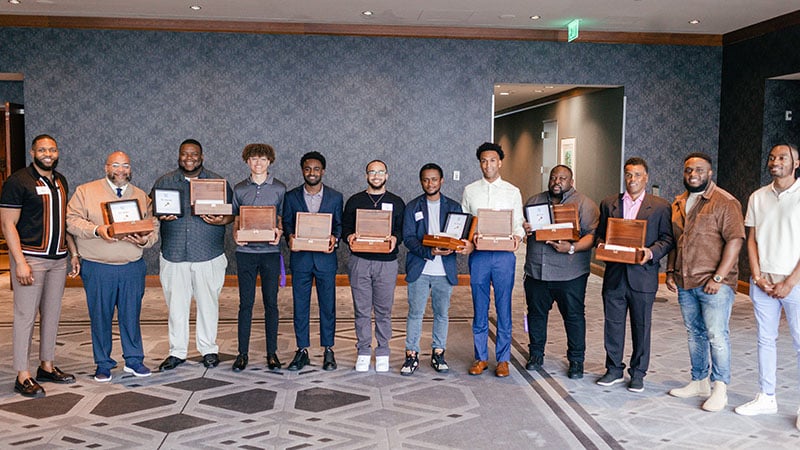Race & Housing: The Racialized Impact of Student Loan Debt on Homeownership and Wealth Building
Guest Blog by Shoreé Ingram, Director of Equity and Inclusion There is an old adage that says, “When America gets a cold, Black folks get the flu.”...

Black families in Minnesota face unique challenges when trying to buy a home. For generations, these barriers were overtly racist housing policies and practices that are now outlawed. Some may consider this ancient history, but understanding the past frames the statistics around Minnesota’s current racial homeownership gap (which is among the worst in the nation).
You also have to remember, for today’s millennial Black families in Minnesota, this isn't ancient history—it’s family history. It is the shared experience of many grandparents of today’s Black homebuyers. This reality contributes to perhaps the biggest barrier these families still face—the existing racial wealth gap.
Our country's and even our state's racist roots run deep. Causes of the current racial wealth gap in Minnesota go back to the treatment of Native Americans in the early 1800s when treaties were broken, and populations were forced onto smaller and smaller land territories. And the gap only widened in the 1900s when white residents looked for systemic ways to racially limit economic mobility, through tactics such as racial deed covenants and redlining.
Currently, a third of all homeowners in America report getting financial help from their parents to buy their first house (1 in 10 even say their parents paid for the entire thing).
Considering the “average per capita wealth of White Americans was $338,093 in 2019 but only $60,126 for Black Americans” (according to the Minneapolis Federal Reserve), it is no surprise that white buyers have an advantage when they visit the “First Bank of Mom and Dad” for help with a down payment. Generations of white families have been able to purchase homes, achieve high school and college educations, and enter the workforce at higher salaries without the systemic barriers Black families have faced for hundreds of years.
Within the racial wealth gap, there is also percent of the population below the poverty level, and again there exists disparities between whites and people of color
in Minnesota. Overall, the state poverty rate has been below the national rate. However, in 2018 it was estimated that more than 20% of the state’s people of color earned incomes below the poverty level, compared to just 7.4% of the white
population. Poverty levels for Black or African Americans (and Native Americans), were the highest across all groups.
Linked to the long-standing wealth gap is the existing student debt gap. Black students graduate with an average of $25,000 more in debt than their white peers. In addition, four years after graduation, 48% of Black students owe an average of 6% more than they borrowed.
Since a person’s debt-to-income ratio helps determine both whether they’re approved for a mortgage and the interest rate they get, the student debt gap creates a very real barrier for many of today’s Black homebuyers.
There was a Governor’s Task Force on Housing in Minnesota a few years ago that made six recommendations to support greater racial equity. One of the recommendations was increasing funding for financial education and counseling programs to support first-time homebuyers.
Minnesota’s racial homeownership gap goes back generations, which means many of today’s buyers who are Black never had the opportunity to watch their parents or grandparents go through the process of buying and owning homes. As observing trusted adults in the homebuying and homeownership process can provide immeasurably valuable training to the next generation of homeowners, this leads to a knowledge or experience gap.
Offering training that helps people understand everything from the pre-approval process to the importance of budgeting for maintenance costs once they own a home is critical for addressing this additional significant barrier to homeownership success for many Black families.
There are macroeconomic factors today (namely, inflation, high interest rates, and a shortage of new home construction) that hamper all buyers. One worth calling out—and which is most prevalent in the Twin Cities’ historically minority neighborhoods—is the practice of corporations buying single-family homes and turning them into rental properties. In some Twin Cities neighborhoods, more than 20% of homes are now investor owned.
As more homes become investments for corporations (rather than foundations for families to build wealth), the housing supply decreases and prices are pushed up further.
Twin Cities Habitat for Humanity is far from alone in looking for ways to create more opportunities for Black Minnesotans to access homeownership.
Many Twin Cities suburbs have created programs to help buyers with downpayments and other resources. One example is in St. Paul, where city leaders are targeting the families and descendants of people who were displaced when interstate 94 was built through the Rondo neighborhood in the 1960s, which was home to a large Black population at the time.
Minnesota lawmakers are also considering a law to curtail corporations from buying single-family homes.
As with real estate agents around the country, Twin Cities realtors have acknowledged past wrongs and are committing to increasing diversity in the profession and improving training for agents in how they support buyers of color going forward.
To learn more about this complex issue, check out Twin Cities Habitat’s blog series Race and Housing.
Your gift unlocks bright futures! Donate now to create, preserve, and promote affordable homeownership in the Twin Cities.

Guest Blog by Shoreé Ingram, Director of Equity and Inclusion There is an old adage that says, “When America gets a cold, Black folks get the flu.”...
.png)
Several years before adopting our new Strategic Plan: Build Forward Together, Twin Cities Habitat began seeking creative solutions to bridge the...

Twin Cities Habitat for Humanity is thrilled to announce our new partnership with Black Men Teach (BMT)—designed to provide pathways to homeownership...